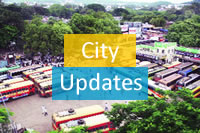The newspaper Daily News & Analysis (DNA) dated 31 August 2011 published a news item with the headline “BMC: Useless to Invest in Public Transport”, largely quoting the Municipal Commissioner. Many of the statements seem unwarranted and contrary to the thinking underlying the National Urban Transport Policy (NUTP) – “buying a car is the best solution for a person to meet his commuting needs and may also be better for the city”; “There’s little sense in spending hundreds of crores on public transportation,
when a majority of the population resorts to private transport”; (Urban planners should) “encourage private transport in a sustainable manner”.
SUM Net believes that the NUTP has correctly set the urban transport agenda by emphasizing the movement of people,
not vehicles and requiring the focus to be on public transport as well as non-motorized transport. Given that even in the present situation a majority of urban commuters use public transport, cycle and walk, it is appropriate that public investment must focus on these modes.
The Ministry of Urban Development should take steps to propagate the National Urban Transport Policy and ensure greater awareness about it, especially amongst bureaucrats and elected representatives. The Ministry should also ensure that all Mission cities which have transport projects submit their Comprehensive Mobility Plans – this will bind cities to the principle of sustainable transportation through planned actions.
The Hon’ble Minister of State Shri Saugata Ray had announced at the last Urban Mobility Conference (Dec 2010) that cities would be mandated to report on the Service Level Benchmarks published by the Ministry. SUM Net asks that the MoUD follow up on that promise.
Cities in Maharashtra are growing very rapidly, and increased motorization is already creating huge problems such as air pollution, increasing no. of accidents and loss of open/green spaces to accommodate traffic. Congestion is increasing and will have a negative impact on the ability of the urban economies to grow. Statements such as those carried in the DNA article send the wrong message to cities, which will incorrectly try and provide for more personal vehicles, which will only make problems worse.
SUM Net requests the Maharashtra State Urban Development Dept. to create a State Urban Transport Policy along the lines of the National Urban Transport Policy and give directives to cities to create and implement Comprehensive Mobility Plans. The Urban Development Dept. should monitor the progress of these plans and also require cities to publish benchmarks which measure how well the cities are on track to achieve a greater share of trips by public transport and non-motorized transport modes. The Urban Development Dept. should also consider capacity building and awareness programs so that more bureaucrats and elected representatives are made familiar with ideas regarding sustainable transport.
If Mumbai does not take active steps to curb the growth of personal vehicles (for instance by creating a parking policy that acts as a deterrent for use of vehicles) the city will face deteriorating air quality, more traffic accidents and a further loss of open/green spaces in a futile attempt to accommodate more and more vehicles. Further, the city will end up investing more public money in infrastructure projects such as the ill-conceived Bandra-Worli Sea Link project, flyovers and more roads, which will mean less money spent on other badly-needed civic amenities. Projects such as these do not help solve congestion – something that cities in the West have already realized – and instead choke the economy of the city and consequently the State and the country.
Low cost measures, such as improving the quality of footpaths, by adopting urban street design guidelines, such as the one published by the Delhi Development Authority (http://bit.ly/streetdesigns), will not only benefit millions of pedestrians but also address the issue of last mile connectivity. Public bicycle schemes, extremely successful in European and now Chinese cities (www.youtube.com/watch?v=Vk0-dbE5YVU) may also be considered by Mumbai.
As CEO of the financial capital of the country, the Municipal Commissioner should rely on professional urban transport planners to help create robust Comprehensive Mobility Plan and take steps to implement it. Urban Transport planning is a serious and intricate subject and should not become a matter of (misplaced) personal opinion.
